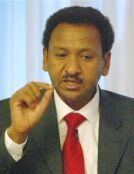Sudan satisfied with UN progress report on Darfur crisis
 KHARTOUM, Oct 6 (AFP) — Foreign Minister Mustafa Ismail said Sudan was satisfied with UN special envoy Jan Pronk’s report to the Security Council on Khartoum’s compliance with resolutions on the Darfur crisis, newspapers reported Wednesday.
KHARTOUM, Oct 6 (AFP) — Foreign Minister Mustafa Ismail said Sudan was satisfied with UN special envoy Jan Pronk’s report to the Security Council on Khartoum’s compliance with resolutions on the Darfur crisis, newspapers reported Wednesday.
“We may not agree with all that was mentioned in the report but there are positive aspects in it like where it points out that the situation in Darfur did not decline” in September, said Ismail, quoted by the official Al-Anbaa daily.
Pronk, UN chief Kofi Annan’s special envoy to Sudan, presented a report to the Security Council on Tuesday on Khartoum’s compliance with two resolutions on the humanitarian crisis in the war-torn Darfur region of western Sudan.
The Security Council passed a resolution on the crisis in September that threatened sanctions on Sudan’s vital oil industry for failing to fully comply with a previous resolution on Darfur.
It urged Sudan to reign in pro-government Arab militias blamed for many of the atrocities in the region and do more to stabilize the security and humanitarian situation in Darfur.
In his report, Pronk argued that the situation had neither declined nor improved since Security Council Resolution 1556.
This, argued Ismail, implied that the progress achieved in August was maintained in September.
But he also regretted that Pronk had not given the government credit for improvements in the Darfur region. Instead, the envoy had “opted to say that the situation did not decline beyond what it was in the previous month”.
Annan wrote to the Council late Monday, saying the Darfur crisis had changed little at the end of September from the time of a previous report a month earlier.
At that time the UN chief said Sudan “had not fully met its obligations … the implementation of the ceasefire, the stopping of attacks on the civilian population, the disarmament of the militia and the prosecution of the perpetrators of the atrocities.”
“In these areas no further progress was made during the month of September,” Annan wrote. “I urge the government to fulfill all of its obligations and commitments.”
“The most important step to be taken in the coming weeks is beginning the deployment of the expanded African Union (AU) force. That force needs to be sizeable. It needs to be speedily deployed.
“It also needs to be a force with a mandate that goes well beyond overseeing the N’Djamena ceasefire,” Annan said.
Ismail countered that the government had already accepted the proposal to boost the size of the AU mission and broaden its mandate in a way that would help build confidence and verify allegations of abuse.
Sudan has also given the green light for the AU to deploy troops in camps for displaced persons in Darfur.
At least 50,000 people have been killed in Darfur and 1.4 million people have fled their homes since two rebel movements rose up against the Khartoum government in February, 2003.
Khartoum’s response was to arm and support the Janjaweed, an Arab militia which has been accused of committing massive human rights abuses against Darfur’s black African people.
